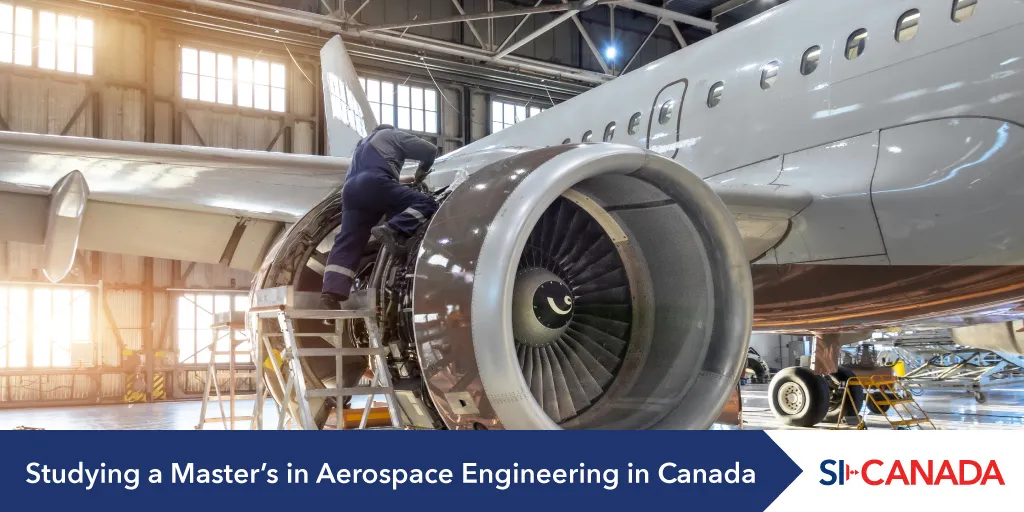Aerospace engineers design, develop, test, and produce aircraft, spacecraft, and related aerospace systems. Whether it is the development of aircraft, satellites, or interplanetary exploration missions, aerospace engineering is the driving force behind humanity's quest to conquer the skies and explore the cosmos. With a rich history of innovation since air travel became possible and a promising future filled with exciting possibilities, aerospace engineering remains an influential field that continues to shape the future of transportation, communication, and exploration.
Canada is mainly known for its strong aerospace industry, which provides avenues for growth to individuals who become a part of the sector. By pursuing a master's in aerospace engineering, one can find unparalleled opportunities to engage with the latest technology and work in this exciting industry.
Several Canadian universities and institutions provide superior education in aerospace engineering. Learn more below, and if you want to have any further questions answered or begin your application to study in Canada, contact SI-Canada for a free consultation today.
Why Study a Master's in Aerospace Engineering in Canada?
1. Exceptional education
Canada is home to many renowned universities and institutions that rank highly in the world's university rankings system yearly. This becomes possible because of the high quality of education that is imparted in different fields of knowledge. Aerospace engineering is also one such field with programs made to give specialized knowledge to students. As the Canadian degree is also recognized worldwide, studying in Canada gives students an international edge who can work anywhere in the world.
2. Thriving aerospace industry
Canada also boasts a robust aerospace industry with major companies like Bombardier, Airbus and numerous innovative startups. It has made significant contributions to the global aerospace and aviation sectors through advancements in the field. As these companies are present in the country, students get the opportunity for internships, research collaboration, and job placements during and after their graduation.
3. Research and innovation
Canadian universities are at the forefront of aerospace research, with projects spanning space exploration, satellite technology, and aircraft design. Companies in the aviation sector also invest heavily in research and development. This environment allows students to engage in groundbreaking research initiatives while pursuing higher education.
4. Post-graduation opportunities
After completing their studies, graduates are well-positioned to take up careers in Canada's aerospace sector or to explore opportunities in the international job market due to the global value of their educational background. In Canada, the scope of working after graduation is even better as students usually get a Post-Study Work Permit to look for jobs in the country for up to three years after graduation.
Aerospace Engineering Universities in Canada
Canada is home to several top universities offering outstanding aerospace engineering programs. The best university for you will depend on your particular interests and overall career goals, but the following are some of the leading institutions known for aerospace engineering in Canada:
- University of Toronto
- University of British Columbia
- McGill University
- Carleton University
- Concordia University
Eligibility Criteria and Admission Requirements
The master's level of education in the field provides an avenue to gain advanced skills and knowledge. The first requirement that must be fulfilled is to have a bachelor's degree in aerospace engineering or any other related field. However, some programs may also accept students with other kinds of engineering backgrounds that can help students continue their master's with a strong foundation in engineering. The admissions are competitive in this field of study, and universities usually expect a GPA in the range of 3.0 or higher on a scale of 4.0. Depending on the educational background, a candidate might also be required to complete specific prerequisite courses in aerospace engineering before starting the master's program.
International students need to demonstrate proficiency in English through standardized tests. This is required by students who are non-native speakers of the language. The institution usually specifies the scores, and one must find the exact scores on the institution's official website. Some master's programs may also prefer applicants with relevant work experience in the field, especially for research-based or specialized programs.
Documents Required
To apply to study for a master's in aerospace engineering in Canada, you would need to apply to the program by arranging a comprehensive set of documents. You will need the following documents:
- Completed application form- This is the first document from the university that you will need to fill out and submit online.
- Academic transcripts- Arrange the official transcripts from previous academic institutions that you have attended. These transcripts should also detail your coursework, grades, and degree conferral.
- Bachelor's degree certificate- You must also include a copy of your completed bachelor's degree certificate or diploma to verify that your educational qualifications meet the requirements.
- English proficiency test scores- International students from non-English-speaking countries particularly need this document. You must submit your English proficiency test scores from standardized scores, such as IELTS, TOEFL, or PTE, to demonstrate language proficiency.
- Letters of recommendation- Normally, you would also need two to three letters of recommendation from your professors or people you have worked with who can vouch for your academic or professional qualifications.
- Statement of purpose- Another important document is a well-structured SOP that outlines your academic and career goals, why you are interested in aerospace engineering, and why you have chosen the specific program and institution.
- Resume- You must also prepare a detailed resume or CV highlighting your educational background, work experience, research projects, publications, and relevant skills.
- Standardized test scores (if required)- There are some programs that may also require the GRE (Graduate Record Examination) scores, so you must also submit these if necessary.
- Financial documentation- Some institutions may also request proof of financial ability to cover tuition and living expenses during your studies, such as bank statements or sponsorship letters.
- Visa documents- If you receive an acceptance letter, you must apply for a study permit (student visa) in Canada. Ensure you have all required visa documents, including the acceptance letter and proof of sufficient funds.
Master's in Aerospace Engineering Fees
The cost of studying for a master's in aerospace engineering in Canada for international students includes several segments. The major is the tuition fees incurred to pursue the course. Most institutions offer the program in the CAD 24,000-70,000 range per year.
Living costs for studying in Canada are the next important segment, depending on the specific city you will study in. Usually, international students would need to shell out almost CAD 10,000-15,000 per year to live and study in Canada.
Aerospace Engineering Scholarships
Most international students can find the cost of studying aerospace engineering in Canada on the higher spectrum. For such students, scholarships and financial aid options can come to the rescue by helping support the study through funding for major segments of the study program. For pursuing graduate studies in aerospace engineering, you can find the following financial aid options:
- Vanier Canada graduate scholarships: Although this scholarship option is not specific to aerospace engineering, it is considered a highly prestigious financial aid option supporting international students pursuing a master's or doctoral degree in Canada.
- Government scholarships: The Canadian government encourages students to come and study in the country through various departments and agencies. These agencies offer scholarships to international students to study in Canada, and most of these options cover graduate study programs. Examples include the Canada-CARICOM Leadership Scholarships Program and the Canada-ASEAN Scholarships and Educational Exchanges for Development (SEED) Program.
- University-specific scholarships: Almost all major Canadian universities offer scholarships for international students to bring in talented and deserving candidates to study at their institutions. You must find if the universities you are interested in, have any scholarships specifically for aerospace engineering programs.
- Canadian aerospace organizations: Apart from all the previous options, you can also consider looking into scholarships offered by Canadian aerospace organizations, such as the Canadian Space Agency, Bombardier, and others. They may offer funding opportunities for aerospace-related studies to international students.
Career Opportunities
If you have earned a master's degree in aerospace engineering, you can take up various jobs and careers in the field. Following are some career opportunities you can pursue after your graduation:
- Aerospace Engineer: This is the most straightforward career path for graduates in aerospace engineering who can join the private or the public sector.
- Aircraft Design Engineer: These professionals usually focus on designing and improving the performance of an aircraft.
- Space Systems Engineer: Organizations like the Canadian Space Agency can offer opportunities in this field to students who specialize in the design and development of space systems
- Systems Engineer: Systems engineers integrate and manage complex aerospace systems.
- Research and Development (R&D) Engineer: As an R&D engineer, you get to work on research projects in aerospace technology, either in academia or with private companies.
- Flight Test Engineer: This role involves testing and evaluating the performance and safety of aircraft and spacecraft through flight trials, and these professionals work closely with test pilots and technical teams.
- Avionics Engineer: Graduates who specialize in designing and developing avionics systems can become avionics engineers.
- Aerospace Analyst: You can work in organizations that provide analysis and consulting services in the aerospace industry, helping companies make informed decisions based on data and market trends.
Study Aerospace Engineering in Canada
Are you interested in joining the exciting aviation industry? If so, arrange a free consultation with SI-Canada to discuss your best options and start your academic journey in Canada.




















